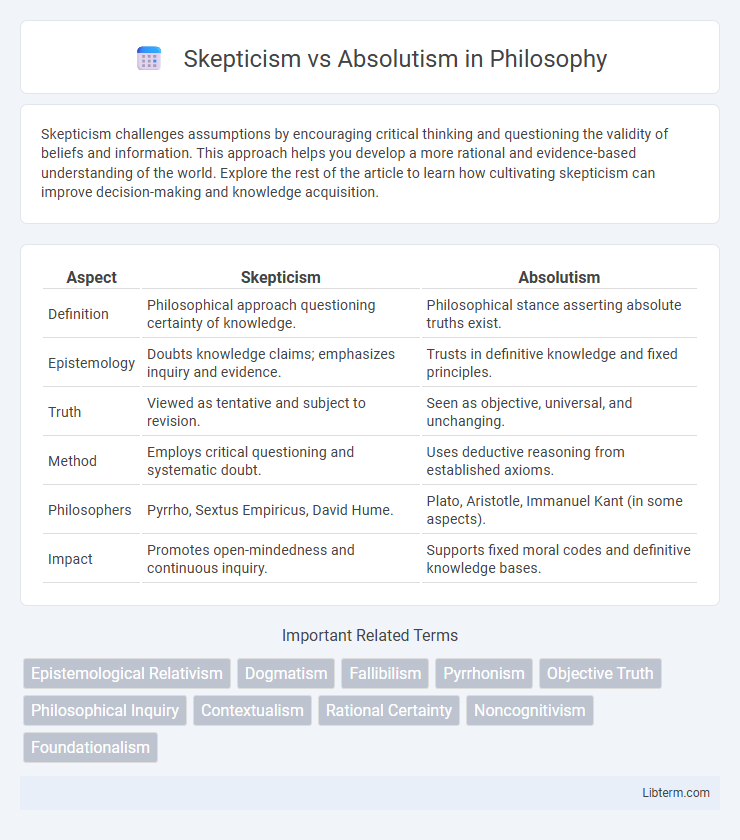Skepticism challenges assumptions by encouraging critical thinking and questioning the validity of beliefs and information. This approach helps you develop a more rational and evidence-based understanding of the world. Explore the rest of the article to learn how cultivating skepticism can improve decision-making and knowledge acquisition.
Table of Comparison
| Aspect | Skepticism | Absolutism |
|---|---|---|
| Definition | Philosophical approach questioning certainty of knowledge. | Philosophical stance asserting absolute truths exist. |
| Epistemology | Doubts knowledge claims; emphasizes inquiry and evidence. | Trusts in definitive knowledge and fixed principles. |
| Truth | Viewed as tentative and subject to revision. | Seen as objective, universal, and unchanging. |
| Method | Employs critical questioning and systematic doubt. | Uses deductive reasoning from established axioms. |
| Philosophers | Pyrrho, Sextus Empiricus, David Hume. | Plato, Aristotle, Immanuel Kant (in some aspects). |
| Impact | Promotes open-mindedness and continuous inquiry. | Supports fixed moral codes and definitive knowledge bases. |
Understanding Skepticism: Key Principles
Skepticism centers on questioning the possibility of certain knowledge, emphasizing doubt and continuous inquiry rather than accepting absolute truths. Key principles include suspension of judgment (epoche), recognition of human cognitive limitations, and reliance on evidence and reasoned argument over dogmatic beliefs. This philosophical stance challenges absolutism by highlighting the uncertainty and variability in human understanding.
Absolutism Defined: Core Concepts
Absolutism is a philosophical doctrine asserting that certain truths or principles are universally valid and unchanging across all contexts and perspectives. It posits the existence of objective, immutable standards in morality, knowledge, or reality, independent of individual beliefs or cultural variations. This framework contrasts with relativism and skepticism by upholding definitive answers and absolute certainty as foundational to understanding truth.
Historical Roots of Skepticism and Absolutism
Skepticism traces back to ancient Greek philosophers like Pyrrho and Sextus Empiricus, emphasizing doubt and questioning of knowledge claims, which shaped early epistemological debates. Absolutism, rooted in the political theories of Thomas Hobbes and Jean Bodin during the 16th and 17th centuries, advocates for centralized authority and unchallengeable power, influencing the rise of modern nation-states. The contrast between these schools reflects fundamental tensions in philosophy and governance regarding certainty and authority.
Major Philosophers: Skeptics vs. Absolutists
Skepticism, championed by philosophers such as Pyrrho and Sextus Empiricus, emphasizes doubt and the suspension of judgment due to the uncertainty of knowledge. Absolutism, advanced by thinkers like Plato and Immanuel Kant, asserts the existence of objective, unchanging truths accessible through reason and sensory experience. The fundamental debate between these schools revolves around whether certainty is attainable or inherently elusive in human cognition.
Comparing Worldviews: Flexibility vs. Certainty
Skepticism emphasizes adaptability and openness to new information, allowing for continuous questioning and revision of beliefs. Absolutism, in contrast, upholds fixed truths and definitive answers, prioritizing certainty and unchanging principles. This fundamental difference highlights skepticism's flexibility in knowledge acquisition versus absolutism's reliance on unwavering certainty.
Epistemological Implications
Skepticism challenges the possibility of obtaining certain knowledge by emphasizing doubt and questioning the justification of beliefs, whereas absolutism asserts that objective and immutable truths exist independently of human perception. The epistemological implications of skepticism involve continuous inquiry and the suspension of judgment due to the absence of indubitable evidence, impacting theories of knowledge acquisition and justification. Absolutism influences epistemology by promoting the search for universal truths and providing a foundation for objective criteria in knowledge validation.
Ethical Perspectives: Moral Skepticism and Moral Absolutism
Moral skepticism questions the existence of universal ethical truths, arguing that moral judgments are subjective and context-dependent, often influenced by cultural and individual perspectives. Conversely, moral absolutism asserts that certain moral principles are universally valid, independent of human opinion or circumstance, providing a definitive framework for distinguishing right from wrong. This ethical dichotomy shapes debates on moral relativism, human rights, and the application of justice across diverse societies.
Practical Impacts on Society and Culture
Skepticism fosters a culture of inquiry and critical thinking, encouraging societies to question established norms and adapt to new information, thereby promoting innovation and tolerance. Absolutism, by reinforcing rigid beliefs and centralized control, often limits social progress and cultural diversity through top-down enforcement of orthodoxy. The practical impact of skepticism manifests in democratic governance and scientific advancement, whereas absolutism typically results in authoritarian regimes and cultural uniformity.
Contemporary Debates in Philosophy
Contemporary debates on skepticism versus absolutism hinge on epistemic justification and truth claims, with skeptics challenging the possibility of certain knowledge while absolutists affirm definitive truths. Philosophers analyze the limits of human cognition, employing modal logic and epistemic theories to argue whether objective truths can be reliably accessed or if all knowledge remains probabilistic. This discourse significantly impacts fields like ethics, science, and metaphysics by questioning foundational assumptions about reality and knowledge certainty.
Bridging the Gap: Is Reconciliation Possible?
Skepticism challenges absolute truths by questioning the certainty of knowledge, while absolutism asserts definitive and unchanging principles. Bridging the gap requires a dialectical approach that embraces epistemic humility without abandoning core convictions, fostering dialogue between doubt and certainty. Integrating critical inquiry with foundational beliefs enables a dynamic reconciliation that respects complexity and nuance in philosophical discourse.
Skepticism Infographic

 libterm.com
libterm.com